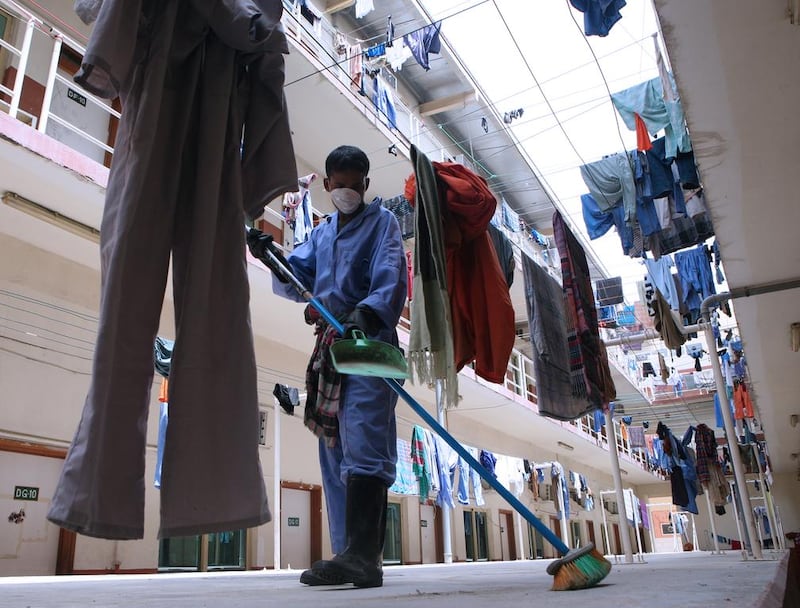DUBAI // Labour camps are ideal breeding grounds for infectious diseases and the wider UAE is at risk, a conference has heard.
Health experts called for better enforcement of labour laws, increased awareness of good hygiene and free medical treatment for all labourers.
These moves would help to reduce the risk of diseases, such as malaria and chickenpox, from spreading, they say.
"The spread of communicable diseases among migrant workers can be fatal and the effects can be wide-ranging," Dr Wasif Alam, director of Dubai Health Authority's public health and safety department, told the Arab Health Congress on Monday.
Camps are often crowded and have inadequate sanitation, sewerage and ventilation systems, and substandard drinking water, Dr Alam said.
“These living conditions create ideal incubators for communicable diseases to spread,” he said.
He also called for education in simple hygiene among employers and employees, such as washing hands. That alone could help to reduce the spread of disease.
“It’s so simple but the magnitude of the problem is dramatic,” Dr Alam said.
There are often six workers to a room with isolation areas for people who fall sick, but sometimes there is not enough space when illnesses are spreading, he said.
Some companies that set up labour camps, particularly smaller ones, may not be following the law.
“There are laws to protect workers,” Dr Alam said. “Much of the laws have not been implemented.”
Many of the UAE's expatriate workers come from countries with endemic infectious diseases, such as chickenpox, tuberculosis, malaria, food-borne illnesses and hepatitis A, B and C.
About 2.2 million workers come from India, 1.25 million from Pakistan and 500,000 from Bangladesh, with another million from other Asian countries.
Some workers fear they could lose their jobs if they report in sick, Dr Alam said.
The issue affects the whole region, with 17 million of 40 million GCC inhabitants being expatriates.
In the UAE they comprise 90 per cent of the workforce, the highest ratio in the GCC. But Saudi Arabia has the highest number – 8.4 million, compared with five million in the UAE.
In 2010, more than 32,000 cases of infectious diseases were recorded in the UAE, Dr Alam said.
Another issue for health officials to consider is that the expatriate population is unstable and large numbers of people enter and exit the country through its airports.
Dubai International Airport visitor numbers increased from less than 10 million a year in 1996 to more than 50 million in 2012, said Dr Farida Al Hosani, manager of the communicable diseases department at the Health Authority Abu Dhabi.
Surveillance of communicable diseases “is hugely important to prevent outbreaks”, Dr Al Hosani said. Health officials must work with the private sector to monitor the population more effectively.
“We can be innovative in terms of intervention for systems in the private sector, hand in hand with the Government,” she said.
Having these systems to monitor outbreaks, such as the Mers coronavirus, will be crucial, Dr Al Hosani said.
“In terms of regulations, I think we have enough here. I think we need to concentrate more on the design of that system and implementing the regulations,” she said.
Dr Al Hosani said infectious diseases, such as hepatitis A and malaria, had been mainly found in people who had recently travelled.
Dr Alam recommended that adequate food, housing, medicine and vaccines are ensured for workers in the region.
He said strong enforcement of labour laws would ensure workers’ medical treatment, vaccinations and first aid was free, as labourers would more readily seek medical help if it was not deducted from their salary.
“I think the governments of our countries have to make sure that these expatriate workers are not taxed for their medical sickness and for medical screenings.
“And of course we need to do more scientific research regarding the scope of communicable disease among the working population in the GCC countries.”
The Arab Health Congress runs until Thursday at the Dubai International Convention and Exhibition Centre.





